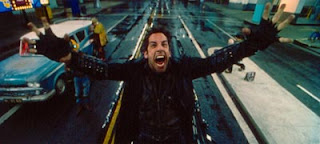This is seen often in the animal kingdom where an animal "puffs itself up" to appear larger than it really is to discourage predators.
Now as normal people, we would rather not have to puff yourself up to prevent or resolve confrontations...
Because it doesn't always work.
So, conversely, there's the approach of "Emptiness" also known as "mu" in Zen Buddhism. The various interpretations of true "Mu" are many, but I seek simplicity in its "nothingness" or "emptiness" translation. For the purpose of this discussion, it shall be interpreted as the absence of reaction to a given stimulus.
This act of "fighting without fighting" often serves to stem the momentum of an escalating situation by denying complementary energy. Be clear: IT IS NOT THE ACT OF BACKING DOWN, but rather a silent opposition. This is often an effective tact, but in some occasions it does incite and aggressive party to instigate action. The caveat to taking "mu" as a tactic is that you must be FULLY PREPARED AND CAPABLE to react to the escalation of the confrontation with the knowledge that you've conceded the initiative and offensive position to your opponent. The discussion of initiative leads into the next facet of self defense: Aggressive or Defensive posture in confrontation.
AGGRESSIVE: Strike before struck. Jeet Kun Do is translated as "The Way of the Intercepting Fist" a concept taken from Wing Chun Kung Fu. In theory, striking denies your opponent the same opportunity (though this isn't always the case) and seizes the initiative in a conflict. This is the attitude and doctrine of the US Special Forces and it works pretty well for them IMO. This tact also implies the ability to strike effectively, so there's that.
DEFENSIVE:
This is the posture that most martial artists "believe" that they assume in a confrontation (more on that later). One waits to receive the attack from the opponent and reacts to neutralize said advance. This position concedes the initiative as mentioned earlier, so an appropriate response is key to neutralizing the incoming assault.
Now of course there are many variations on these stances depending on the situation and the individuals involved. It must also be noted that not all of the martial disciplines are intended solely for self defense. Krav Maga, Taekwondo, and Muay Thai to name a few, were martial arts in the purest sense as they were developed for warfare. Shaolin Wu Shu, Aikido, and Capoeira had roots in a more "defense-minded" environment. Today these arts are taught and practiced in largely self defense or competitive capacities, although some are still used in combat. At the end of the day though, the practice of the art is up to the practitioner.
This leads me to my final point:
And it kinda intersects my previous post to a degree...
There is a space along the path of many a martial artists' path where he/she has learned enough to feel comfortable enough in a conflict that the fear of it is greatly diminished. This is a great point in one's training journey, but it is often marked by the unrelenting need to PROVE ONE'S SELF. Now when the arts are taught with an element of Buddhism or pacifism, this is LESS likely to occur, but once again, the outcome is based on the temperament of the practitioner. This is often manifested in the attitude of "looking for a fight". The artist actually welcomes conflict as a means to release the built up energy from hours of pain and toil perfecting their art.
As the debate over gun control rages, there are some who believe that confrontation while armed is more likely due to a sense of protection that the firearm bestows. A trained martial artist can be likened to a person who is armed at all times. So many times, the artist will walk TOWARDS a conflict as opposed to AWAY from one. The question this presents is whether the confrontation was abated or exacerbated by the presence of this "armed" individual. Oftentimes the "put up or shut up" option quickly becomes the ONLY possible resolution. This flies in the face of the intent of many martial arts. Are you defending yourself if you walk across the street to attack a potential assailant? What if you stop running and turn to face them? This can and will be argued in both directions until the end of time.
Is a vengeful ass whuppin' a justifiable one? For some, that becomes a spiritual or religious issue. What about a pre-emptive strike?
At the end of the day, the ultimate form is formlessness. And the "Art of Fighting Without Fighting" may be the ultimate expression of that form.
-Lonewolf.














.jpg)




































